Original title: Acute Severe Mitral Regurgitation Following Balloon Mitral Valvulotomy: Echocardiographic Feature, Operative Finfing and Outcome in 50 Surgical Cases. Reference: Manjunath C. Nanjappa, et al. Catherization and Cardiovascular Intervention 81:603-608 (2013)
Severe Mitral Insufficiency Following Mitral Valvotomy (VPM) is a major complication; though not frequent, (0.9%-2%) it is life threatening and requires resolution through valve replacement.
The aim of this series was to analyze the evolution of patients with acute severe mitral insufficiency following VPM. 3855 patients undergoing VPM were analyzed, 50 patients (1.3%) presented ASMR after procedure and where referred to surgery. Wilkins score was ≤8 in 23 of those 50 patients. The most frequent signs of ASMR were hypotension and hypoxia followed by orthopnea and acute pulmonary edema.
The most frequent cause of severe MR was posterior mitral leaflet tear (36 patients), it was also observe a paracommisural tear with annular involvement (7 patients), posterior mitral leaflet tear (5 patients) and chordal tear (2ptes). The time from end of procedure to replacement surgery was between 3 and 96 hrs, and 6 patients died in this period (12%).
Patients were analyzed according to the moment of surgery and were divided in 2 groups: 24 hrs (11 patients). Both groups shared similar characteristics, mortality being significantly higher in the second group (1/39 vs 5/11, p<0.001).
Conclusion:
Hypotension and hypoxia were the most common symptoms of Severe Mitral Insufficiency Following Mitral Valvotomy and posterior mitral leaflet tear was the most frequent cause. In this scenario, early valve replacement is most recommended.
Editorial comment:
Mitral Valvotomy is a complex procedure that presents a low complications rate but these can be severe. Clinical, hemodynamic evaluation, with eco-Doppler is essential seeing that they not only help evaluate results, they also help diagnose complications and make the correct and timely decisions.
Courtesy of Dr. Carlos Fava.
Interventional Cardiologist.
Favaloro Foundation. Argentina.
Dr. Carlos Fava para SOLACI.ORG





